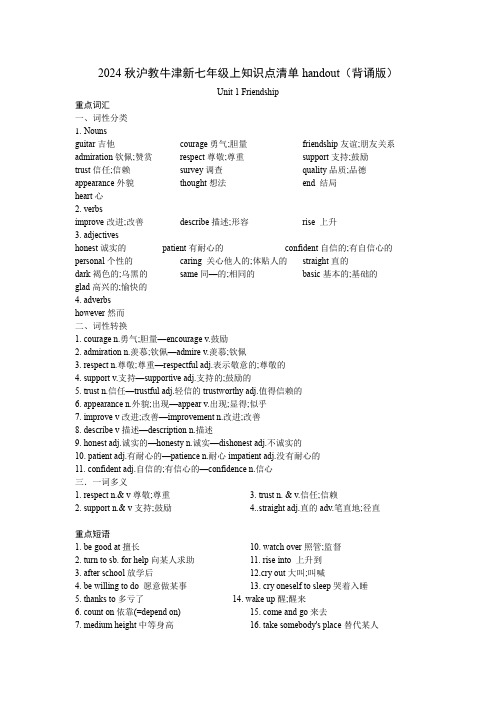沪教牛津版七上U知识点语法
沪教牛津版七上U知识点语法

亠、用a , an, the 或者填空1. There is water on the floor.2. There is orange on desk.3. There is 'nrf in 'climb' and there is 'u' in 'country】、用括号内动词的适当形式填空。
1. He ofte n( have) dinner at home.2. Nick (not go) to the zoo on Sun day.3. they(like) pears4. She is a( Germa n ) girl.5. rd like( drink ) a cup of tea.三、改错(划出错误的地方,将正确的写在横线上)1. Is your brother speak En glish2. She don ' t do her homework on Sun days.四、单项选择11. —Lily is En glishgirl.——And sheisfrien dly girl.A. a ; an14. Jas on ' s favouriteA. hobbiesriversC. D. an ; anare En glish and maths.B. subjectsC. mountainsD.20. do you go to schoolBy school bus.A. HowB. What timeC. WhyD. Which1. Read a Germa n girlGerman :'s blog 。
(Page1)②n.德国人,是可数名词。
复数形式要在后面加可数名词。
意为“德语”时,是不speak Germa n。
②余中日不变,英法变,其余S加后面。
中国China,中国人/中文Chinese法国France,法国人/法语FrenchEn glishFrenchmar、Englishman 等的复数把 a 改为 e.2.Every day , I go to school by school bus.go to school 是一个固定搭配,不要在具体的某所学校。
上海牛津七年级上Unit知识点

上海牛津版七年级上Unit知识点————————————————————————————————作者:————————————————————————————————日期:博轩教育英语牛津上海版7A Unit4 Seasons编者:张素恒一、Words and expressions1、favourite=like…best2、complete=finish e.g. complete the poem 完成这首诗3、footprint(s) sandy footprints 沙中脚印make footprints in the snow 踏雪4、puddle(s) 水坑5、kick(ed) e.g.He kick the door hard.6、during e.g. People usually spend time with their relatives duringthe Spring Festival.7、Everything=all the things Everybody=all the people8、Send out light=shine9、quite quite different二、Phrases in common use1、in different parts/areas of the world 世界各国2、talk about sth=discuss about sth3、get warm;get angry;get cold turn green;left;right; 变得…4、blow gently 轻轻吹5、fall from The leaves start falling from the trees.6、go on a picnic=go for a picnic=go to have a picnic7、cool and dry干燥凉爽cold and snowy冰天雪地8、spend time with sb=stay with sb=play with sb9、go on a trip=go for a trip=travel to…10、put sth in the correct order11、turn sth into sth turn A into B12、(be)get married with sb=marry sb三、Sentence patterns1、Which seasons do you like best? I like…best.2、How many/much(数量);How often(频率,多少次);How long(时间长度);How soon(多久之后);How far(距离,多远);How deep(深度)How long…? How long have you been a teacher? 3 years.How soon…? How soon will you go aboard?(出国) 3 months later.3、What is the weather like?=How is the weather?4、It is +adj. for sb to do sth. E.g. It’s frightening for me to walk alone instreet at night.5、四、GrammarThe usage of adjective(形容词用法)一、形容词(词组)作名词修饰语绝大多数形容词既能作名词修饰语,又能作补语,例如:The boy is intelligent.(作补语)He is an intelligent boy.(作名词修饰语)His life is very happy.(作补语)He lives a very happy life.(作名词修饰语)注意:某些作补语的形容词词组转化为前置修饰语时不可按原来的“修饰语+形容词中心语”的次序出现。
沪教牛津版七年级上册第三单元知识点归纳

沪教牛津版七年级上册第三单元知识点归纳一.重点单词及词组1. protect the Earth 保护地球We should do our best to protect the Earth.我们必须尽最大努力去保护地球。
2. protect sb./sth. from 保护某人/物My mother protects me from danger.我妈妈保护我让我免受危险。
The little boy protects the toy from water.那个小男孩保护玩具不受水的影响。
3. provide … with… 为……提供These people provide the kids with clothes.这些人为孩子们提供衣服。
4. be covered by… 被……覆盖The road is covered by the heavy snow.路被厚厚的积雪覆盖。
5. make energy 制造能源By reducing demand for petroleum, biofuels could make energy supply more secure. 通过降低石油的需求,生物燃料可以让能源供应更加安全。
6. put ?.into 把?..放入??Put the gift into the box.把礼物放进盒子里。
7. stop doing sth停止做某事He stops working and takes a rest.他停下工作休息了一下。
stop to do sth停下来去做某事He stops to do homework.他停下(打游戏等其他事情)去做家庭作业。
8. throw away 扔掉Don’t throw away the book.不要把书扔掉。
throw about 乱扔Don’t throw about the waste paper.不要乱扔废纸。
沪教牛津版七上U1-4知识点语法

沪教牛津版七上U1-4知识点语法一、形容词形容词用来描述名词的性质、状态、特征等。
它可以位于名词的前面或后面,用来修饰名词。
例句:1. This is a beautiful flower.(这是一朵美丽的花。
)2. She is a tall girl.(她是一个高个子的女孩。
)形容词的比较级和最高级:形容词的比较级和最高级用来表示两者或多者之间的比较。
形成比较级和最高级的方法:1. 一般情况下在形容词后直接加-er/-est,如bigger/biggest。
2. 以-e结尾的形容词,在后面加-r/-st,如nicer/nicest。
3. 以辅音字母+y结尾的形容词,先变y为i,再加-er/-est,如busier/busiest。
4. 重读闭音节单音节形容词和部分双音节形容词,在词尾加-er/-est,如hotter/hottest。
5. 部分双音节和多音节形容词前加more/most,如beautiful/more beautiful/most beautiful。
例句:1. This book is more interesting than that one.(这本书比那本书更有趣。
)2. They are the tallest buildings in the city.(它们是这个城市最高的建筑物。
)二、名词名词是用来表示人、事物、动物、地点、抽象概念等的词。
例如:1. I have a cat.(我有一只猫。
)2. Tom is a student.(汤姆是一个学生。
)名词的单数和复数形式:大部分名词加-s/-es构成复数形式,但也有一些不规则变化,如man/men,woman/women等。
例句:1. There are many apples in the basket.(篮子里有很多苹果。
)2. I have three dogs and two cats.(我有三只狗和两只猫。
沪教牛津版初中英语七上教材短语句型知识点汇总

Unit 1 Making friends读:读一个德国女孩的博客听:听一个男孩询问一个女孩有关她的网友的情况语法:学习如何提问和回答特殊疑问句。
学习何时在名词前使用a或an 说:学会发部分音素的音,告诉一些同学关于你自己的情况写:完成一封给新朋友的电子邮件A.短语归纳1.listen to 听2.play basketball 打篮球play the guitar 弹吉他3.be from=come from 来自4.close to 接近5.go to school 去上学go home 回家6.be good at=do well in 擅长be good for 对……有好处be good to 对……好be good with 善于应付……的7.make friends with 与……交朋友8.all over the world=around the world 全世界9.answers to these questions 这些问题的答案10.look like 看起来像be like 像11.pay attention to 注意12. a boy called/named 一个名叫……的男孩13.start with=begin with 以……为开始14.by bus 乘公交汽车(作状语)take the bus (作谓语)15.far away from 离……远16.lots of=a lot of 许多的,大量的a lot 大量,非常17.fly kites/fly a kite 放风筝18.hear from sb.=get/receive a letter from sb. 收到某人的来信19.in English/German/Chinese/Japanese 用英语/德语/汉语/日语20.best wishes 最美好的祝愿21.in one’s free time 在某人的空闲时间B.句型归纳1.be good at doing sth.= do well in doing sth. 擅长做某事2.like doing/to do sth. 喜欢做某事3.want 想要做某事would like 愿意做某事need to do sth. 需要做某事hope 希望做某事decide 决定做某事4.welcome to 欢迎来到5.how many+ 名词复数how much+ 不可数名词6.what do/does sb. do? 某人是做什么工作的?7.What do(es)…mean? ……是什么意思?8.one’s dream is to be… 某人的梦想是当……C.语法一、特殊疑问句1.定义2.句型结构二、不定冠词1.基本用法2.不定冠词的活用1)表示“一”这个数量,但数的概念没有“one”强烈2)用在时间或度量衡的名词前,表示单位“每一”3.不定冠词a/an的区别4.固定搭配5.不用冠词的情况Unit2 Daily life读:读一名学生关于他的日常生活的文章听:听一个男孩谈论他的周末语法:学习如何使用一般现在时。
上海沪教版牛津英语七年级上册U1-U5基础知识和完型填空技巧

【知识梳理】Unit5词性转换1. Africa(n.)—African (adj.\n.)2. Europe(n.)—European (adj.\ n.)3. Greece(n.)—Greek (adj.\ n.) 希腊---希腊人/语、希腊的4. fierce (adj.)-fiercer, the fiercest—fiercely (adv).-more fiercely, the most fiercely5. gentle (adj)—gentleness (n.)—gently (adv.)6. exist (v.)—existence (n.)7. harm(n.)—harmful (adj.) —harmless (adj.)8. die(v.)—dead(adj.)—deadly (adv.)—death (n.)-dying(adj.)(将死的)9.think-thinker-thought 想---思想家---思想10. amuse-amusing-amused-amusement 使开心---令人感到开心的---感到开心的---娱乐A famous amusement park 一家著名的游乐园11.create (v.)—creator(n.)—creation(n.) —creative(adj.) —creatively (adv)12. complete (v\adj) — completely (adv.)13. choose (v.) (choose-chose-chosen)—choice (n.)14. real (adj.)—reality (n.)15.secret-secretary 秘密的---秘书16.serious-seriously 严重的---严重地17.main-mainly 重要的---主要地18.France法国- French法国人,法国的19.peace(n.)和平-peaceful (adj.)- peacefully adv.和平地,平静地20.attraction n.吸引,有吸引力的事物---attractive. adj 有吸引力的---attract v.吸引21. memorial n.纪念碑---memory n. 记忆---memorize v. 记忆22. visit v 参观---visitor n.参观者23.hurt n.伤害---hurt---hurt24.create →v. 创造creation n. 创造→ creative adj. 有创造力的→ creator n. 创造者25.art 名词艺术→名词artist 艺术家26.Africa名词非洲→African形容词27.gentle-gentler-gentlest温顺的28.real (adj.)-- really (adv.)-- reality (n.) 现实【精选词汇】1. be used as a teaching centre被用作教学中心→ be used as…被用作…→ use…as…把…用作…〈知识链接〉be used as…→ use…as…,e.g. English is used as the first language in the USA.2. operate on 150 patients→operate on…=perform/do an operation on…给…做手术〈知识链接〉operate→operation→operating room手术室→operating table手术台〈用法拓展〉operate v.操作e.g. ①Can you operate computers? ②This machine doesn’t operate well.3. be proud to be able to help so many people→ proud adj.骄傲的;自豪的→pride n.骄傲〈知识链接〉⑴be proud to do sth因做某事而骄傲/自豪,I’m proud to be a member of the team.⑵be/feel proud of…以…为骄傲/自豪,e.g. He is proud of his achievements.⑶be/feel proud+that从句,以…为荣,e.g. She’s proud that her son has so much talent.⑷be the pride of…是…的骄傲,e.g. His great success is the pride of us.4. be able to+动词原形,常用于一般现在时、一般过去时,也与情态动词must, may或助动词will等连用,e.g. You must be able to speak French for this job.〈比较〉can/could+动词原形,只用于一般现在时、一般过去时。
2024秋沪教牛津新七年级上知识点清单(背诵版)

2024秋沪教牛津新七年级上知识点清单handout(背诵版)Unit 1 Friendship重点词汇一、词性分类1.Nounsguitar吉他courage勇气;胆量friendship友谊;朋友关系admiration钦佩;赞赏respect尊敬;尊重support支持;鼓励trust信任;信赖survey调查quality品质;品德appearance外貌thought想法end 结局heart心2. verbsimprove改进;改善describe描述;形容rise 上升3. adjectiveshonest诚实的patient有耐心的confident自信的;有自信心的personal个性的caring 关心他人的;体贴人的straight直的dark褐色的;乌黑的same同—的;相同的basic基本的;基础的glad高兴的;愉快的4. adverbshowever然而二、词性转换1. courage n.勇气;胆量—encourage v.鼓励2. admiration n.羡慕;钦佩—admire v.羡慕;钦佩3. respect n.尊敬;尊重—respectful adj.表示敬意的;尊敬的4. support v.支持—supportive adj.支持的;鼓励的5. trust n.信任—trustful adj.轻信的trustworthy adj.值得信赖的6. appearance n.外貌;出现—appear v.出现;显得;似乎7. improve v改进;改善—improvement n.改进;改善8. describe v描述—description n.描述9. honest adj.诚实的—honesty n.诚实—dishonest adj.不诚实的10. patient adj.有耐心的—patience n.耐心impatient adj.没有耐心的11. confident adj.自信的;有信心的—confidence n.信心三.一词多义1. respect n.& v尊敬;尊重 3. trust n. & v.信任;信赖2. support n.& v支持;鼓励 4..straight adj.直的adv.笔直地;径直重点短语1. be good at擅长10. watch over照管;监督2. turn to sb. for help向某人求助11. rise into 上升到3. after school放学后12.cry out大叫;叫喊4. be willing to do 愿意做某事13. cry oneself to sleep哭着入睡5. thanks to多亏了14. wake up醒;醒来6. count on依靠(=depend on)15. come and go来去7. medium height中等身高16. take somebody's place替代某人8. modern dance现代舞17. come along 出现9. take care of照顾(= look after / care for)核心句式1. What do you like doing?你喜欢做什么?2.Li Hua is helpful and patient.李华乐于助人且有耐心。
上海牛津版七年级英语上册Unit1知识点详解归纳

上海牛津版七年级英语上册Unit1知识点详解归纳Unit 1 Relatives in Beijing知识清单知识网络重点1. 掌握现在完成时的语法结构,并能运用现在完成时描述过去延续到现在的事件。
2. 掌握用形容词比较级描述事物和物品。
3. 学习并掌握表示方位的词组。
4. 用how引导的疑问句提问5. 书信的写作格式。
难点1.运用现在完成时描述已经发生的事情。
2.语言知识的迁移应用。
易错点1.方位名词表达方向。
2.现在完成时的使用。
高频考点1.现在完成时和be going to结构。
2.运用形容词比较级比较事物。
牛津词汇词汇清单invite v.邀请brick n.砖expensive adj.昂贵的stone n.石头;石料;岩石talk to 说话;讲话;谈话mountain n.高山;山岳*brochure n.资料手册ancient adj.古老的agent n.代理人;经纪人history n.历史soon adv.不久;很快;马上interest n.吸引力;趣味在(八月)底holiday n.假期at the end of(August)*swan n.天鹅wonderful adj.精彩的;令人高兴的raise v.提升;举起another pron.另一(事物或人)national adj.国家的知识梳理第一部分:词汇精讲1. invite v. 邀请I’ve invited the Smiths to visit us next Friday. 我已经邀请史密斯一家下周五来家里玩。
【短语】invite sb. to do sth.【联想记忆】invitation n. 邀请函;请柬Hundreds of invitations are being sent out this week.本周数百张请贴正在发出。
区别invite和invent区别发音:invite [ɪn'vaɪt] invent [ɪn'vent]区别词义:invent vt. 发明;创造【联想记忆】invention n. 发明物inventor n. 发明者He invented the first electric clock. 他发明了第一个电子钟。
- 1、下载文档前请自行甄别文档内容的完整性,平台不提供额外的编辑、内容补充、找答案等附加服务。
- 2、"仅部分预览"的文档,不可在线预览部分如存在完整性等问题,可反馈申请退款(可完整预览的文档不适用该条件!)。
- 3、如文档侵犯您的权益,请联系客服反馈,我们会尽快为您处理(人工客服工作时间:9:00-18:30)。
7A UNIT 1 Making friends练习题一、用a ,an,the 或者 \ 填空1.There is ______ water on the floor.2.There is ___ orange on ____ desk.3.There is _____ ‘m’ in ‘climb’ and there is ______ ‘u’ in‘country’.二、用括号内动词的适当形式填空。
1. He often ________(have) dinner at home.2. Nick ____ ___(not go) to the zoo on Sunday.3. ______ they ________(like) pears4. She is a ________ ( German ) girl.5. I’d like ________ ( drink ) a cup of tea.三、改错(划出错误的地方,将正确的写在横线上)1. Is your brother speak English __________________2. She don’t do her homework on Sundays. _____________四、单项选择11. —Lily is _______English girl.—And she is _______friendly girl.A. a; anB. a; aC. an;aD. an;an14. Jason’s favourite _______are English and maths.A. hobbiesB. subjectsC. mountainsD. rivers20. —_______do you go to school—By school bus.A. HowB. What timeC. WhyD. Which知识点1.Read a German girl’s blog。
(Page1)German :① adj.德国的(德国人的,德语的) This is a German car。
② n.德国人,是可数名词。
复数形式要在后面加“s”。
意为“德语”时,是不可数名词。
speak German。
中日不变,英法变,其余S加后面。
(关于单复数)中国China,中国人/中文Chinese 日本Japan,日本人/日语Japanese,法国France,法国人/法语French 英国England/Britain/.英国人/英语EnglishFrenchman、Englishman等的复数把a改为e.2.Every day,I go to school by school bus.(page3)go to school是一个固定搭配,不要在“ school”前加“the”。
因为它并不指具体的某所学校。
所在在前面不要加任何冠词。
Go to bed 睡觉; go to hospital去医院; at home 在家注意:play basketball/football(球类),不用加“the”。
Play the piano/violin(乐器),要加“the”。
3.I like many sports.(page3)many :许多。
修饰可数名词复数。
Many sports 许多人Much:许多。
修饰不可数名词 much water/time 许多水/手机a lot of既可以修饰可数名词又可以修饰不可数名词。
4.I’d like to be your e-friend. 我想成为你的网友。
(page11)I’d like =I would like 想要用法:①would like +名词如:I’d like an apple.②would like +to do sth注意:①would like 没有人称和数的变化。
②would like 构成的一般疑问句中,表示“一些”和“某物”时,要用“some”和“something”,而不用“any”和“anything”。
Would you like some bread.——Yes,please./No,thanks.语法一、人称代词单数复数第一人称第二人称第三人称第一人称第二人称第三人称人称代词主格I you he she it we you they 宾格me you him her it us you them 主代形容词性my your his her its our your their1.am只能和第一人称单数I(我)连用,2.is和单数第三人称he /she /it(他/她/它)连用,3.are和复数第一和第三人称复数及第二人称的单复数连用。
口诀: 我(I)是(am),你(you)是(are,)is就跟他/她/它。
二、句子模式两种句子模式:A:无行为动作句子,简称“Be动词句子模式”。
就是这个句子里面没有表示行为动作的部分,造句时就用 Be动词的形式。
B:有行为动词句子,简称“行为动词句子模式”。
例如:(1)我在家。
I am at home.(2)我在家吃早饭。
I have breakfast at home.三、特殊疑问句以疑问代词what, who, whom, whose, which或疑问副词when, where, why,how等放在句首提问的句子,叫特殊疑问句。
答句必须针对问句中的疑问词来回答。
(一)各种疑问词的用法:(二)(三)回答:不能用yes / no,即问什么答什么,尤其是简略回答。
如: -How old is your sister 你妹妹今年多大了名词性mine yours his hers its ours yours theirs四、不定冠词的用法(一)用途①表示“一”,用于可数名词的单数形式前。
The company needs a worker.②表示“一类”,指一类人或事物,用在可数名词单数前。
An elephant is bigger than a cat.(二)用法7A UNIT 2 Daily life练习题一、单项选择1. My home is near my school, so I am late.A. alwaysB. sometimesC. oftenD. seldom2. —What Sam after class—He takes part in the school band practice.A. is; doB. does; doC. do ; doD. does;does3. Tom is good at playing.A. pianoB. a pianoC. pianosD. thepiano二、句型转换with her best friend often flies a kite in the park.(改为一般疑问句)___________________________________________________always goes to the Swimming Club on Tuesday afternoon.(否定句) ___________________________________________________三、动词填空1. He often________ ( go)to school on foot every day.2. I always________ (go) to the park on Sundays.知识点school is close to my home, so I always go to school on foot.(page17)①be close to 离……近= near =beside= not far away from(上节课学过)②so在此处用作连词,表示结果“因此;所以”的意思。
不可以将because 和so同在一个句子里。
(他们两个就像两只老虎,一山不能容二虎。
类似的还有although/ though 和but。
)语法一、一般现在时一般现在时,动词一般用原形。
表述事实讲真理,习惯动作常发生。
动词词尾加-s(es),只表单数三人称。
若变一般疑问句,得看句型是哪种。
系表结构和there be,be放句首可完成;若遇实义动词句,do或does莫忘用。
(一)含义:表示经常性或习惯性的动作,或表示现在的特征或状态。
1.表示事物或人物的特征、状态。
如:The sky is blue.天空是蓝色的。
2.表示经常性或习惯性的动作。
如:I get up at six every day.我每天六点起床。
(二)一般现在时的构成1. be动词:主语+be(am,is,are)+其它。
如:I am a boy.我是一个男孩。
2.行为动词:主语+行为动词(+其它)。
如:We study English.我们学习英语。
当主语为第三人称单数(he, she,it)时,谓语动词要用第三人称单数,即要在动词后加"-s" 或"-es"。
如:Mary likes Chinese.玛丽喜欢汉语。
(三)一般现在时的变化1. be动词的变化。
①否定句:主语+ be + not +其它。
如:He is not a worker.他不是工人。
②一般疑问句:Be +主语+其它。
如:-Are you a student -Yes. I am. / No, I'm not.③特殊疑问句:疑问词+一般疑问句。
如:Where is my bike2.行为动词的变化。
(do/does)①否定句:主语+ don't( doesn't ) +动词原形(+其它)。
如:I don't like bread.当主语为第三人称单数时,要用doesn't构成否定句。
如:She does not play the guitar.②一般疑问句:Do( Does ) +主语+动词原形+其它。
如:- Do you often play football - Yes, I do. / No, I don't.当主语为第三人称单数时,要用does构成一般疑问句。
如:- Does she go to work by bike - Yes, she does. / No, she doesn't.③特殊疑问句:疑问词+一般疑问句。
如:How does your father go to work(四)动词碰到第三人称单数时,要进行相应的变化:动词+s的变化规则1. 一般情况下,直接加-s,如: work - works2. 以s. x. sh. ch. o结尾,加-es,如:guess-guesses, wash-washes, watch-watches, go-goes3. 以“辅音字母+y”结尾,变y为i, 再加-es,如:study-studies carry - carries4. have - has二、频度副词always总是,一直100%usually通常80%左右often经常50%sometimes有时20%seldom很少5%never从不,绝不0%②频度副词位置be后He is always kind to others. 他总是对别人很好。
